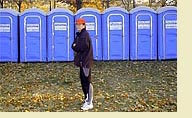|
|
||||
 |
 Marathon Report: All in a Day
Marathon Report: All in a Dayby Sandy Sorlien I ran my first marathon last year. You hear a lot about people saying that completing a marathon is a life-changing event, the hardest thing they've ever done, exhilarating, grueling, blah blah blah. I suppose all this is true, but as I ran it the marathon took on a certain shapeliness, a structure that seemed strangely familiar. I thought about it after I finished (on my feet, happy, and not throwing up), and realized that what I had experienced was a coming-of-age process, the trajectory of a life in microcosm. Here's how it goes: First, you train for nine months. Then The Start: You are born. The morning is glorious, the future bright, you briefly cry, then the doctor spanks you (oh sorry, I shouldn't be telling my marital secrets here). You take off into the world in a confusing jumble of other bodies amidst party balloons, cheers, and best wishes. Miles 1-12: You have a pretty good time. No major demands on you. You notice all the new things around you, the car-free streets, the signs made by the spectators, the people running in strange costumes -- one guy in full Superman regalia including cape, one guy in a pale green tuxedo with tails, one guy covered head-to-toe in red white & blue stripes. You meet new friends, talk and run happily through the park on a sunny Sunday. Miles 13-20: The awful teenage years. Why am I starting to feel different? Why is everything so annoying? Why is that person trying to have a conversation with me? Everything's a mess, your digestion is screwed up, your mood swings wildly, different parts of your body hurt, the future has no meaning, you just want to get outta there and take some drugs! (Even Superman is affected... he is spotted WALKING down Main Street at Mile 20. A shopkeeper yells out, "Come on, Superman, get going!" He replies, "They put Kryptonite in the Gatorade." Sure enough, the Gatorade is green.) Miles 21-26: You come out of adolescence with a sense of responsibility and purpose. You take on a regular job and start plugging away, one step at a time, concentrating on the road directly in front of you, but with your longterm goals firmly in mind. Less mature individuals are a distraction at this time. (Around Mile 25, I have to shout at two silly men who are doing airplane swoops across my path, "Hey, some of us are trying to concentrate here!") Mile 26.2: You die. Just kidding, life is not over, only the race, thank God, and you can go out to dinner wearing your Finisher's Medal and eat a big steak and mashed potatoes and a nice merlot and pumpkin bread pudding with caramel sauce, and sleep for 10 hours with Band-Aids on your blisters. The Next Day: You are a creaky old woman, barely able to get down the stairs or lower yourself onto the toilet. You also have the impaired memory of old age, and have forgotten that the race itself was largely a painful experience, and gaily announce to all that you are going to do it again next year. So what if it's hard? It's also amazing. That's life. © 2001 Sandy Sorlien |
 |
Links to Sandy’s books: contact: sandysorlien@comcast.net Center for Applied Transect Studies Sandy’s Blog: Sandy’s Business: All photographs |
|